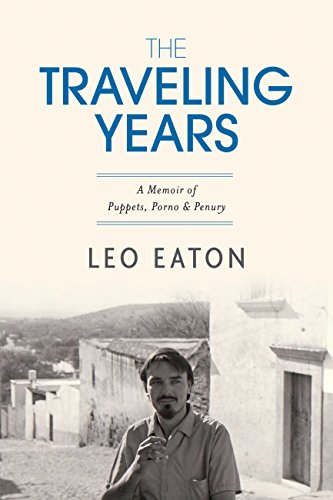 By LEO EATON (BookBaby; 2016)
By LEO EATON (BookBaby; 2016)
Q: Who is Leo Eaton? A: He’s a London-born, America-based documentary filmmaker who in 2016 turned out a furiously enjoyable memoir. A household name Leo Eaton may not be, but based on what’s revealed in THE TRAVELING YEARS he’s led an interesting life without question.
This affectionate and unassuming page-turner focuses on what the years 1964-80, an “exciting, dramatic, funny, wonderful, humbling, scary and character-building time that profoundly shaped the documentary filmmaker I then became.” No, ON THE ROAD and hippiedom didn’t figure into it, with Eaton beginning his adulthood as a straight-laced fellow working in the British film and television industries.
His jobs included making promotional shorts for the British Government, laboring as an assistant director on the Roger Moore series THE SAINT and directing several episodes of the Gerry Anderson puppet series CAPTAIN SCARLET AND MYSTERIONS. Eaton’s stories of these exploits are compelling and instructive, with descriptions of mob-connected extras and Roger Moore’s demeanor as a nice guy with a formidable temper.
Eaton’s tenure in the British film industry ended with a love affair that went sour. This resulted in a sea trip to Mexico—specifically San Miguel, a haven then (and now) for bohemian expatriates. There he wrote a novel, was briefly interred in a Mexican jail and, after his six month visa expired, spent a summer on an Ontario farm, where he helped fix up the boat of a sailing enthusiast pal.
Most interesting to me was the following portion of Eaton’s life, which commenced with a hitchhiking trip to Los Angeles. There a San Miguel colleague helped get Eaton a job writing pornography for the smut outfit Pendulum Publishers, alongside Pendulum’s star writer Ed Wood. About the latter Eaton admits “I wish I’d been kinder, wish I’d spent more time with him, wish I’d asked the questions that, in hindsight, we would all like to ask Ed Wood Jr.”
From there Eaton returned briefly to San Miguel, where he spent the summer of 1971 as a “drug mule” (by passing through a police checkpoint with marijuana in his pants) and getting involved with Jeri, a young American woman he later married. She was attending the University of Texas, where Eaton got a job teaching film production by claiming to have a non-existent degree from Oxford. Among his students were several crewmembers of THE TEXAS CHAINSAW MASSACRE, whose iconic Volkswagen van was borrowed—and totaled—by Eaton shortly after filming was completed.
In 1974, following an aborted film shoot and the revelation that his Oxford degree was nonexistent, Eaton and Jeri decamped to his home base of London, where he spent the next three years making government sponsored documentaries. But wanderlust struck again, resulting in an idyllic three year stay in a “small and primitive” house in a small village in Crete. This was followed by a far less copacetic seven month attempt at living in a shack, which required constant fixing up, in Portugal, amid poverty-stricken neighbors he found “bleak and unfriendly”—although Eaton claims to have learned from the experience that “only after Jeri and I stopped struggling and accepted our powerlessness did fate or providence or some higher power step in.”
Next was a flight back to Texas, where Eaton began production on his first American made documentary and initiated “the Third Stage of my life’s journey that continues to this day.” Whether that stage is as eventful as the previous ones I have no idea, but what he’s recorded here is interesting enough to stand on its own as a fully-rounded Life Story.
